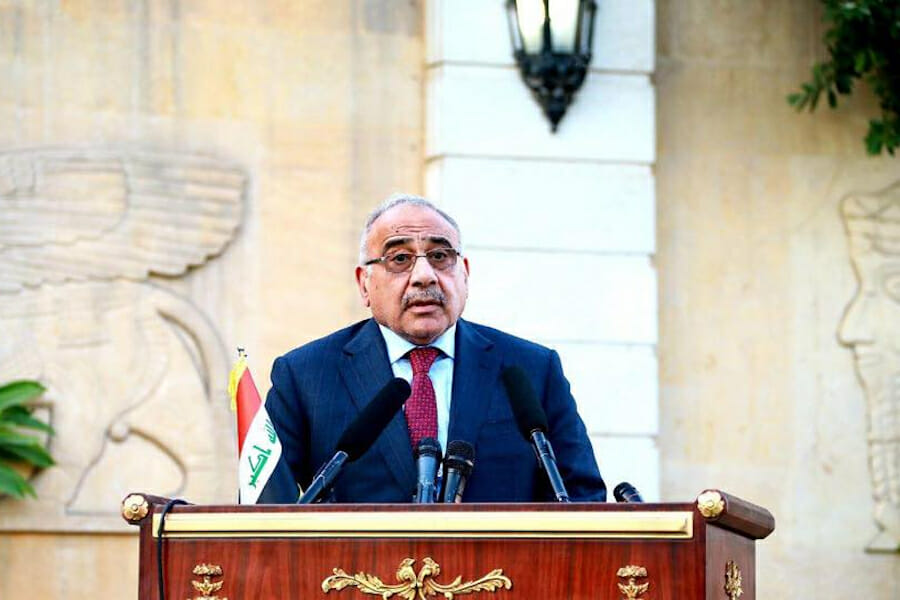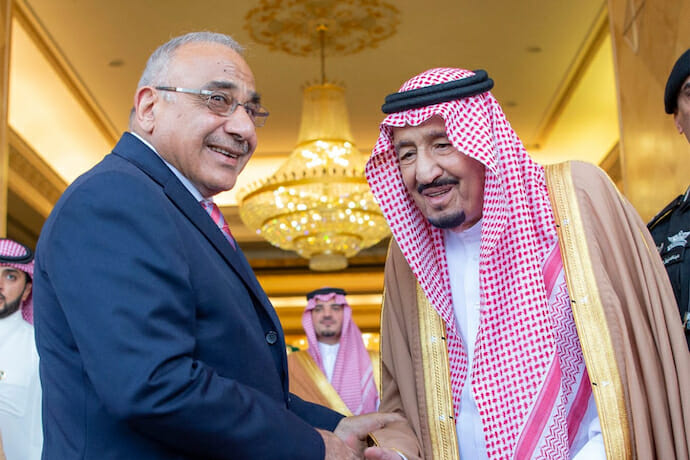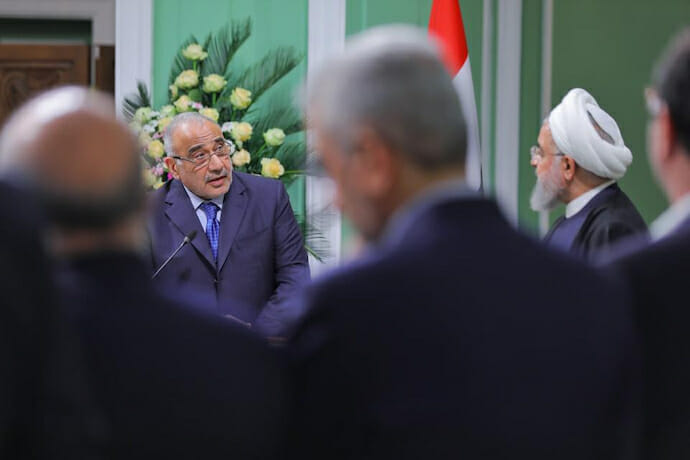
Iraq’s Pragmatism: Between Iran’s Sanctions and Saudi Grand Designs
Three decades after the Iran-Iraq war ended, relations between both states have strengthened thanks to regional events. The 2003 invasion of Iraq that overthrew Saddam Hussein left a power vacuum in Baghdad that was filled by Tehran’s taking advantage of the Shiite connection and Daesh presence in Iraqi territory.
The rupture of the nuclear treaty between Iran and the United States and President Donald Trump’s decision to classify the Islamic Revolutionary Guard as a terrorist organization has created a challenge for Iraqi Prime Minister Abdel Abdul-Mahdi. As a result, Abdul-Mahdi has had to navigate between extremes based on Iraq’s economic and political development and needs. On the one hand, Washington is a guarantor of the opening to the international system, while Tehran is the main energy supplier and together with Turkey one of the two most relevant commercial partners of the Iraqi Republic.
In this context and faced with the impossibility to meet its energy needs, a waiver for 45 days was given by the Trump administration with the purpose for Abdul-Mahdi to find a way to reduce dependence on Iran, bringing Saudi Arabia closer as a reliable source. However, the Trump administration plan collided with Iranian structural power in Iraq. Iran’s influence on different sectors of the Iraqi government forced the United States to extend the waver for 90 days.

From distrust to close ties
After the end of the Iran-Iraq War, relations between both were maintained in a latent warlike state. However, Saddam Hussein’s fall at the hands of United States, guaranteed Tehran the possibility of strengthening its ties with Iraqi Shia political communities. As a result, Iran’s popularity grew and peaked with the Daesh advent as a threat to Baghdad’s integrity. Likewise, Iranian power was not reduced only to political-military aspects, it also involved the Iraqi market opening to Iranian companies that wanted to grow after the end of international sanctions on Tehran’s economy.
The conflict with Daesh which damaged the Iraqi economy showcased the precarious infrastructure development and especially the incapacity to provide essential basic services in energy, despite having the suitable natural resources to fulfill this aim. In this context, Iran became Iraq’s main gas and electricity supplier, accounting for 40% of national consumption. Moreover, since Hassan Rouhani’s rise to power, the Persian country took a relevant role in the international market. For example, last year Iran’s exports to Iraq amounted to $12 billion and 5 million tourists visited Shiite holy places in both countries, generating an estimated revenue of $5 billion.
In this context, Abdul-Mahdi is struggling to maintain balance-pragmatism between the United States and Iranian supporters. Abdul-Mahdi is aware of the importance of both partners for the survival of his government, but he notes with concern that sanctions imposed by the Trump administration on Iran impacts Baghdad’s local economy. Twenty-two cooperation agreements were signed during Hassan Rouhani’s visit to Iraq and they discussed solutions to avoid Iran’s difficult position in the international scenario. For example, the Iranian ambassador, Iraj Masjedi, recently stressed that “taking into consideration problems that have emerged in banking transactions based on dollar, the joint proposal is to use dinar in our trade.”
On the other hand, the Iraqi government is suffering the effects of weak economic performances in Turkey and Iran. The Turkish lira crisis impacted on GDP, foreign direct investment and business. Meanwhile, Donald Trump’s decision to classify the Islamic Revolutionary Guard as a terrorist group endangers some of the bilateral plans, like the Basra-Shalamchech railway project which includes Syria as well, the joint exploration of Naftshahr and Khorramshahr oil-gas fields and the relevant investment in defence by companies linked to the Iranian military, estimated $20 billion in business.

Finally, the scenarios described are a clear example of how Iran managed to enhance its structural power over Iraq. As a consequence, Abdul-Mahdi requested from the United States a waiver to maintain food exchanges for gas with Hassan Rouhani’s government. As a result, the Trump administration adopted a double position. On the one hand, the administration ceded for only 45 days, while on the other, Washington pushed for Saudi Arabia to increase its presence in the Iraqi market and replace Teheran as the main supplier.
The Saudi plans
In this complex regional framework, the Saudi government has recently opened a consulate in Baghdad for the first time in 30 years. Bilateral relations had been severely damaged during the Gulf War in the early 1990s and the breakdown deepened after the Daesh irruption as a threat to Iraqi territorial sovereignty. As a consequence of these distant links, the first official visit of a foreign Minister from Saudi Arabia to Iraq was in 2017, thirty years since the last meeting.
The Saudi approach to Prime Minister Abdul-Mahdi’s government takes place while the United States decides to extend the electricity-gas waiver for 90 days with the aim to strengthen Iraqi independence and mitigate Iran’s power over the Arab country. In addition, the Alliance between Donald Trump and Mohamed bin Salman allowed Riyadh to increase its area of influence in the Levant through a pragmatic policy that built links without any sectarian crisis.
On the other hand, during Baghdad’s consulate opening, the Kingdom delegation committed to invest $1 billion in real estate and development projects such as a sports complex. At the same time, they provided a loan to the Iraqi government of $500 million to boost exports.
Finally, Riyadh also intends to take advantage of the Turkish economic crisis which is one of the most relevant Iraqi commercial partners. This situation allows the Saudi government to move its pieces in the Iraqi puzzles. For example, Rushdie Mahmoud Rashid al-Ani, ambassador of Iraq in the Arab Gulf country, declared that Abdul Mahdi will visit Saudi Arabia in the last week of April to attend the signing of thirteen agreements between both states. Three of them are aimed at promoting cooperation in the oil sector. The Baghdad government offered 186 business opportunities during the second session of the Saudi-Iraqi Coordination Council.
The Iraqi pragmatism
After years of clashes between the Ayatollah regime and Saddam Hussein’s government, Iran has consolidated its structural power over Iraq. In turn, the Washington-Tehran conflict represents a complicated challenge for Abdul Mahdi who must do his best to maintain pragmatism between both extremes and mitigate the effects on the local economy. More than 100 Persian companies are operating in the Iraqi market and the importance of Iranian gas is key to achieve the energy supply for the Iraqi national productive sectors.
On the other hand, the United States is conscious of the difficult economic situation in which Iraq finds itself. Therefore, Washington has decided to extend the electricity-gas waiver for 90 days, guaranteeing the exchange agreement of food for gas between Baghdad and Tehran. Meanwhile, Saudi Arabia is pushing to become the new energy supplier, offering contractual benefits such as discounts to Iraq.
In this context, Mohammed bin Salma’s strategy is based on an investment package destined for development projects and exports promotion. This should ensure the building bridge that allows them to “overcome” sectarian problems.
The Iraqi government is demonstrating to the world and the region a pragmatism that characterizes it due to the country’s economic needs. The prime minister held a meeting with Hassan Rouhani, and he will visit Saudi Arabia for the first time in 30 years. Meanwhile, Washington’s policy to Iraq has not yet found a way to solve this complex situation.

